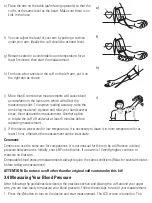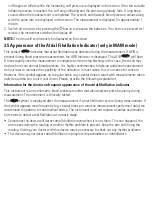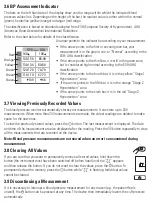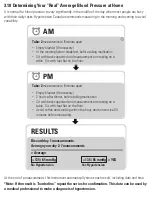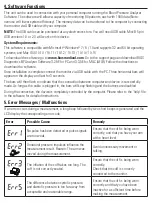
This device is easy to use and has been proven in clinical studies to provide excellent accuracy. Before
using the 3MS1-4Y, read this instruction manual carefully and keep it in a safe place.
1.2 Important Information
Refer to the following sections to learn about important safety instructions and how to take care of the
BIOS Diagnostics™ Ultra Blood Pressure Monitor with Atrial Fibrillation Screening.
1.2A Safety Information
• Self-measurement means control, not diagnosis or treatment. Your values must always be discussed
with your doctor or a physician who is familiar with your family history.
• If you are undergoing medical treatment and receiving medication, consult your doctor to determine
the most appropriate time to measure your blood pressure. Never alter the dosages of any medication
without direction from your doctor.
• Your blood pressure depends on several factors, such as age, gender, weight and physical condition. It
also depends on the environment and your state of mind at the time of measurement. In general, your
blood pressure is lower when you are asleep and higher when you are active. Your blood pressure may
be higher when recorded at a hospital or a clinic and may be lower when measured in the relaxing
comfort of your home. Due to these variations, we recommend that you record your blood pressure
regularly at home as well as at your doctor’s clinic.
• Try to record your blood pressure regularly at the same time of the day and under the same conditions.
This will help your physician detect any extreme variations in your blood pressure and thus treat you
accordingly.
• Morning Hypertension (> 135 / 85 mmHg): Recently, several studies have identified elevated
cardiovascular risks (heart failure, stroke, angina) associated with “morning hypertension”. There is a
typical rise in blood pressure during the physiological changes from sleep to arising for the day.
• The ideal time to measure your blood pressure is in the morning just after you wake up, before
breakfast and any physical activity, and in the absence of the urge to urinate. If this is not possible, try
to take the measurements later in the morning, before you start any physical activity. Relax for a few
minutes before you record your blood pressure.
• Your blood pressure increases or decreases under the following circumstances:
Blood pressure is higher than normal:
— When you are excited, nervous, or tense
— While taking a bath
— During and after exercise or strenuous physical activity
— When it is cold
— Within one hour after meals
— After drinking tea, coffee, or other caffeinated drinks
— After smoking tobacco
— When your bladder is full
Blood pressure is lower than normal:
— After consuming alcohol
— After taking a bath
• The pulse display is not suitable for checking the frequency of heart pacemakers.

















